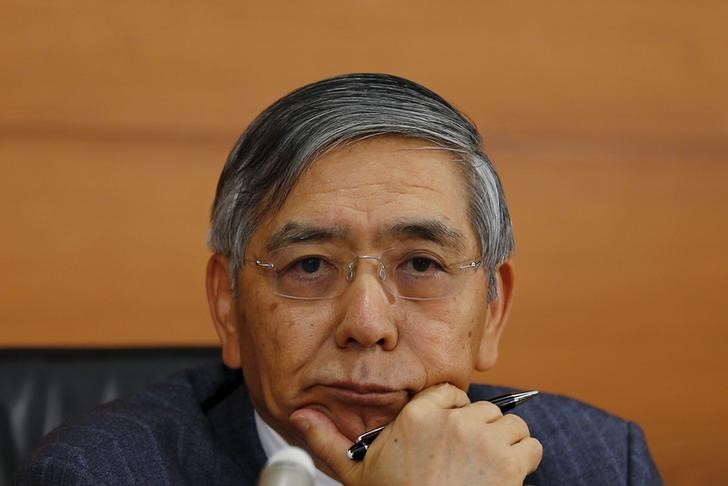(Bloomberg) -- The Bank of Japan is on course for a historic turning point that would see its bond holdings shrink next year for the first time in a decade, according to a Bloomberg News analysis.
It is a remarkable prospect for a central bank that has refused to drop guidance for boosting government debt holdings by 80 trillion yen ($740 billion) annually, even as it steadily tapers purchases since pivoting to yield-curve control in 2016.
The long-term implications for the world’s second-largest sovereign bond market will be far reaching if -- as the analysis suggests -- the BOJ’s debt holdings start to shrink from next August. According to Bloomberg calculations, that is when the central bank’s purchases will fall short of redemptions, theoretically reducing downward pressure on yields.
What’s sped up the tapering is a global bond rally that has seen more Japanese rates go negative, spurring Governor Haruhiko Kuroda to scale back purchases to steepen the yield curve. Shrinking bond holdings would set it apart from its two main peers again, as the Federal Reserve expands its balance sheet for reserve management purposes and the European Central Bank resumes asset purchases.
“The tapering is a reminder of the need for the BOJ to focus on its main policy framework, which is yield-curve control and downplay the emphasis on an asset purchase target,” said Aninda Mitra, senior sovereign analyst at BNY Mellon Investment Management in Singapore. “There’s a need, going forward, to completely discard any pretense whatsoever that asset purchases will continue at a specific amount per annum to accomplish the inflation objective.”
The prospect of a fall in debt holdings may prompt the BOJ to rethink its tapering, review pledges or even overhaul its policy framework. It isn’t clear if the BOJ sees the same likelihood of the holdings declining. The central bank meets later this month amid speculation it may ramp up stimulus to boost growth.
Gross bond purchases by the BOJ may total 49.4 trillion yen in 2020 if it keeps tapering at the aggressive pace seen in the first nine months of this year, according to Bloomberg calculations. At least 55.9 trillion yen worth of debt it holds will be redeemed over the same period.
Bloomberg News forecast changes in the central bank’s bond holdings by subtracting expected redemption of debt from the estimated monthly purchases. This assumes that tapering will continue at the same pace as the first nine months of this year, which has averaged 123.6 billion yen a month. Based on the calculations, the BOJ’s debt holdings will start to drop next August compared with a year ago.
Allowing that to happen may boost a moribund debt market. In a 2018 paper, BOJ’s researchers found that 90% of the decline in the nation’s bond yields came due to the “stock effect” of its large holdings. The central bank owns almost half of the nation’s outstanding government debt.
The aggressive tapering does leave the central bank with a contradiction on its guideline of expanding debt holdings. It could also cast further doubt on the BOJ’s commitment to keep stimulating the economy until it achieves 2% inflation.
“It will be confusing” if they don’t address the buying guideline, said Hideo Kumano, a former BOJ official who is now a chief economist at Dai-Ichi Life Research Institute. “It will be hard to say if the BOJ is tightening or easing. The BOJ must review policy overall. Otherwise, they will end up doing patchwork to reduce side effects again and again.”
Without more clarity, yen bulls may take the change in debt holdings as a sign that the BOJ is normalizing its monetary policy.
“What this signifies is the BOJ quietly walking away from the quantity part of quantitative easing,” said Ayako Sera, a market strategist at Sumitomo Mitsui Trust Bank Ltd. in Tokyo. “Should the BOJ’s bond holdings start to decline on a trend basis, the yen could shoot up beyond 100 per dollar.”
A stronger yen would hurt the BOJ’s attempts to inflate the economy. Kuroda has said the central bank is committed to easing until the nation overshoots a 2% inflation target. The central bank’s other tools include buying exchange-traded funds and a policy rate of minus 0.1%.
Japan’s Latest Desperate Experiment in Monetary Policy
Recently, Kuroda has expressed concern about the flattening of the yield curve, a global phenomenon as investors price in a worldwide economic slowdown. The BOJ signaled deep purchase cuts for October, and said it may even skip buying debt maturing in 25 years or more.
Yet, it’s unclear if the BOJ’s recent efforts had any lasting impact on the yields of long-term debt. Yields on 30-year debt gained 4 basis points on Oct. 1 to 0.41%, the day after the central bank announced its monthly plan.
It was at 0.39% at the Friday close.
This suggests that the BOJ faces limits in a global bond rally. Anytime the central bank pulls back, life insurers and pension funds jump in to buy debt and bring down yields.
“Long-dated yields won’t probably rise unless the BOJ sells bonds,” said Sumitomo Mitsui’s Sera.
